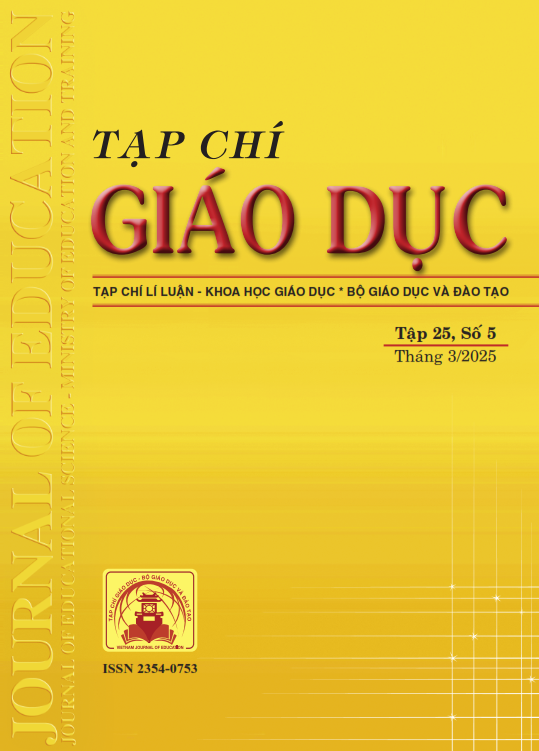Kiến tạo hệ sinh thái giáo dục số: Cấu trúc và mô hình
Tóm tắt
Digital transformation is reshaping education, necessitating technology integration into all aspects of teaching and learning. This process requires a comprehensive digital education ecosystem where infrastructure, policies, schools, teachers, students, parents, and suppliers operate synchronously. The article presents theoretical perspectives and proposes implementation recommendations, supporting education managers, researchers, and technology enterprises in designing and applying practical solutions. Specifically, the research analyzes and proposes key factors in building a digital education ecosystem, including technology platforms, digital content, teachers, students, parents, and support policies. In addition to proposing an integration model between components to optimize the learner experience and improve teaching efficiency, the article discusses significant challenges, such as technology gaps and resource constraints. At the same time, practical solutions are proposed to overcome these barriers and move towards a sustainable and effective digital education.
Tài liệu tham khảo
Anderson, S. C., Elsen, P. R., Hughes, B. B., Tonietto, R. K., Bletz, M. C., Gill, D. A., Holgerson, M. A., Kuebbing, S. E., MacKenzie, C. M., Meek, M. H., & Veríssimo, D. (2021). Trends in ecology and conservation over eight decades. Frontiers in Ecology and the Environment, 19(5), 274-282. https://doi.org/10.1002/fee.2320
Barron, B. (2006). Interest and self-sustained learning as catalysts of development: A learning ecology perspective. Human Development, 49(4), 193-224. https://doi.org/10.1159/000094368
Begon, M., Townsend, C. R., & Harper, J. L. (2006). Ecology, from Individuals to Ecosystems (4th ed). Blackwell Publishing.
Bronfenbrenner, U. (1979). The ecology of human development: Experiment by nature and design. Harvard University Press.
Chang, E., & West, M. (2006). Digital Ecosystems A Next Generation of the Collaborative Environment. Information Integration and Web-based Applications & Services, 3-24. https://dblp.uni-trier.de/db/conf/iiwas/iiwas2006.html#ChangW06
Costa, M. A. da S., Nedzhad, A., & Lucic, D. (2021). Designing a digital education ecosystem. In Proceedings of the 68th International Scientific Conference on Economic and Social Development. Aveiro.
Eldredge, N. (2002). Life on earth: An encyclopedia of biodiversity, ecology, and evolution. ABC-CLIO. https://doi.org/10.5040/9798216190813
Falk, J. H., & Dierking, L. D. (2018). Viewing science learning through an ecosystem lens: A story in two parts. In D. Corrigan, C. Buntting, A. Jones, & J. Loughran (Eds.), Navigating the changing landscape of formal and informal science learning opportunities (pp. 9-29). Springer International Publishing.
Falk, J. H., Dierking, L. D., Osborne, J., Wenger, M., Dawson, E., & Wong, B. (2015). Analyzing science education in the United Kingdom: Taking a system-wide approach. Science Education, 99(1), 145-173. https://doi.org/10.1002/sce.21140
Hecht, M., & Crowley, K. (2019). Unpacking the Learning Ecosystems Framework: Lessons from the Adaptive Management of Biological Ecosystems. Journal of the Learning Sciences, 29(2), 264-284. https://doi.org/10.1080/10508406.2019.1693381
Nguyen, L. T., & Tuamsuk, K. (2022). Digital learning ecosystem at educational institutions: A content analysis of scholarly discourse. Cogent Education, 9(1). https://doi.org/10.1080/2331186x.2022.2111033
Põldoja, H. (2016). The structure and components for the open education ecosystem: Constructive design research of online learning tools. Aalto University, Helsinki, Finland. http://urn.fi/URN:ISBN:978-952-60-6993-7
Polechová, J., & Storch, D. (2008). Ecological niche. In Encyclopedia of Ecology (pp. 1088-1097). Academic Press. https://doi.org/10.1016/B978-008045405-4.00811-9
Reyna, J. (2011). Digital teaching and learning ecosystem (DTLE): A theoretical approach for online learning environments. ASCILITE Publications. https://doi.org/10.14742/apubs.2011.1809
Thủ tướng Chính phủ (2017). Quyết định số 117/QĐ-TTg ngày 25/01/2017 phê duyệt “Đề án tăng cường ứng dụng công nghệ thông tin trong quản lí và hỗ trợ hoạt động dạy - học, nghiên cứu khoa học, góp phần nâng cao chất lượng giáo dục và đào tạo giai đoạn 2017-2020, định hướng đến năm 2025”.
Thủ tướng Chính phủ (2020). Quyết định số 749/QĐ-TTg ngày 03/6/2020 phê duyệt “Chương trình chuyển đổi số quốc gia đến năm 2025, định hướng đến năm 2030”.
UNESCO (2020). Distance learning solutions. https://en.unesco.org/covid19/educationresponse/solutions
Tải xuống
Đã Xuất bản
Cách trích dẫn
Số
Chuyên mục
Giấy phép

Tác phẩm này được cấp phép theo Ghi nhận tác giả của Creative Commons Giấy phép quốc tế 4.0 .












